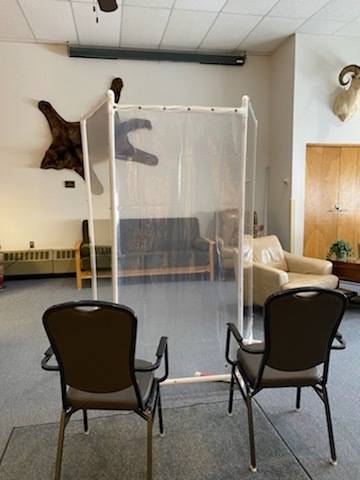Heritage Place residents who are fully vaccinated against COVID-19 can touch their loved ones again and all residents can have more visits within the facility.
That’s according to new guidance issued Wednesday by the Centers for Medicare and Medicaid Services (CMS) in collaboration with the U.S. Centers for Disease Control and Prevention.
CMS’s new guidance says that facilities should allow “responsible” indoor visitation at all times for all residents, regardless of whether or not the resident or their visitors have been vaccinated. In announcing the new guidelines, CMS cited a decline in COVID-19 transmission and infections, high vaccination rates in nursing homes and in acknowledgement of the “physical and emotional toll” physical separation has caused residents and their families.
The changes will allow in-person, unsupervised visits in rooms and common areas for all residents, as long as the percentage of residents who are vaccinated remains above 70% and the county’s average daily case rate for the past two weeks stays below 10. As of Thursday, Central Peninsula Hospital External Affairs Director Bruce Richards said that 37 of Heritage Place’s 49 residents, about 75%, had been vaccinated. The Kenai Peninsula Borough’s average daily case rate for the past two weeks was 6.42.
Heritage Place Administrator Sandi Crawford said Thursday that their goal is to finalize their new protocols on Monday, but that they will screen all visitors upon arrival and will be scheduling visits in advance. Scheduling visits, she said, will prevent too many people from being in the building at once. Some visits can take place in residents’ rooms, while others can take place in common areas, she said, as visits no longer need to be supervised.
The relaxed guidelines are only possible as long as 70% of residents are vaccinated, however, and Crawford said Heritage Place’s percentage of 75% is delicate. Two or three new admissions of people who are not vaccinated, she said, could throw that number below 70%. If that happens, those guidelines would only apply to residents who are fully vaccinated.
“That’s why it’s so important for residents that are long term, that they get the vaccination, so you can have that little bit of leeway on the new admission, you know, so that it doesn’t throw your number down,” Crawford said.
Not everyone living at Heritage Place is a long-term resident, Crawford said. Some stay just for a couple of weeks as a rehabilitation period after things like medical procedures or other conditions for which they were being treated at CPH.
Crawford said she thinks the caveat will incentivize more long-term residents who had previously denied the vaccine to become vaccinated, which would keep the overall percentage of vaccinated residents more stable. The number of residents at Heritage Place declined over the course of the COVID pandemic, she said, but it is starting to tick back up.
A challenge that Heritage Place still faces, however, is that only 40% of their staff have been vaccinated. Residents and staff of long-term care facilities have been eligible to receive the COVID-19 vaccine since last December, which Crawford said is when they did their initial vaccinations. Since then, staff have been eligible to be vaccinated at community clinics, or through Central Peninsula Hospital at any of their availability over the past months.
“Because we’re a part of the hospital, any time somebody says, ‘Hey, I want one,’ we’re able to get it to them, because we send them to the hospital program who is continuing to vaccinate employees,” Crawford said.
The trend of long-term care staff hesitant to be vaccinated, State Epidemiologist Dr. Joe McLaughlin said during a Thursday press conference, is not unique to Heritage Place or even to the state of Alaska. But, he said, there can be a lot of variability in hesitancy rates between facilities.
“On average, we’re seeing lower vaccine uptake among workers in those settings than we are in many other settings,” McLaughlin said. “It’s surprising to a lot of people … there are lots of incentives that we can start thinking about to really promote vaccination among workers in long-term care facilities and assisted-living facilities and people need to really be thinking creatively about how to message directly to that group.”
Crawford said that, ultimately, how many Heritage Place staff are vaccinated won’t impact residents’ visitation because they don’t factor into CMS’s new guidelines.
“[CMS is] not tying any of the visitation or the change in the guidance to employee vaccinations, only to resident vaccinations, which is good for us,” Crawford said.
Reach reporter Ashlyn O’Hara at ashlyn.ohara@peninsulaclarion.com.

